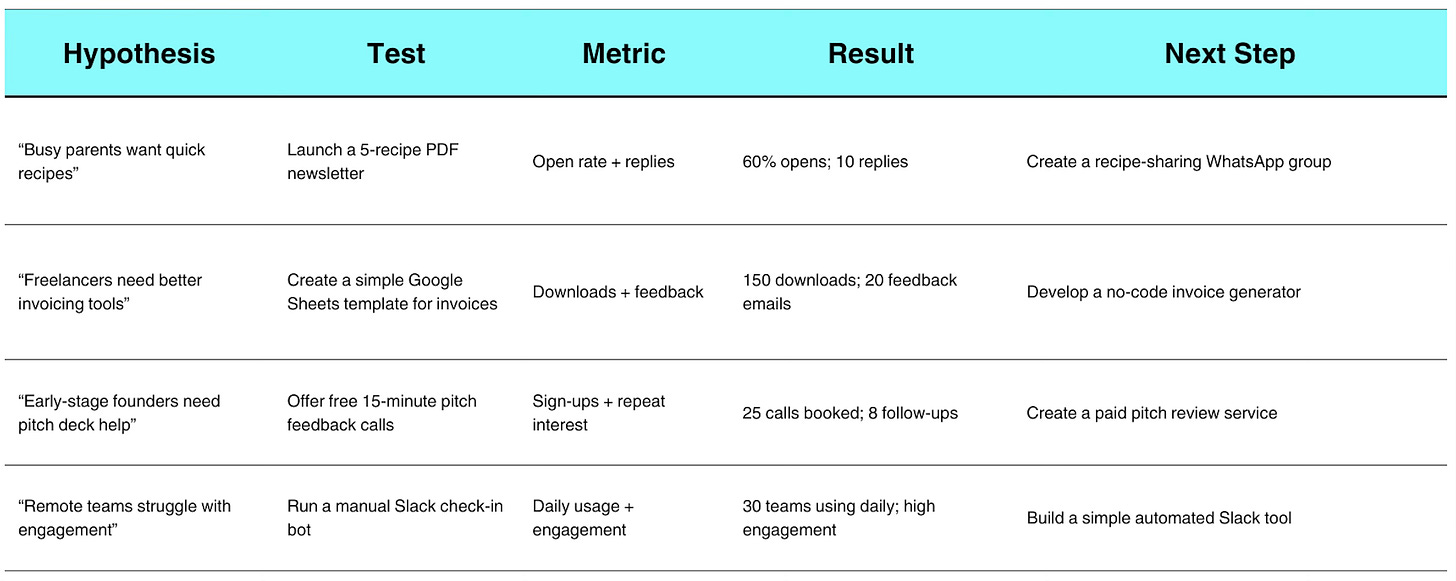Your Startup Isn’t a Business—It’s an Experiment
Test before you build, or risk building what no one wants.
You’ve been lied to.
Startups aren’t businesses—they’re experiments.
Treating yours like a "real company" too early? That’s like planting a seed and immediately hiring landscapers. You’ll waste time, money, and energy on something that might never grow. Let’s rethink your approach.
Why “Business” Mindsets Backfire
Most founders rush to hire teams, lease offices, and scale marketing. But without validating their core idea, they’re building on quicksand.
Take Quibi: They raised $1.75B to launch a premium short-video platform but never tested whether people actually wanted to pay for it. Less than six months after launch, they shut down.
Contrast that with Notion. The team initially built an overly complex productivity tool that users found confusing. Instead of scaling prematurely, they scrapped it, rebuilt from scratch, and tested a simpler version with a small group of users. Once engagement spiked, they scaled.
Your goal isn’t revenue or headcount. It’s survival.
Modern Successes That Started as Experiments
Ever used BeReal?
Instead of launching with a full-fledged social network, the founders tested a simple concept: one unedited photo per day. No likes, no filters—just raw moments. They launched exclusively to 500 students at French universities. When 85% of them posted daily, they knew they had a hook. That core habit turned BeReal into a viral success.
Or look at Deel. Before investing heavily in development, the founders ran a manual concierge MVP, handling global payroll and compliance manually to test demand. This cost them $0 in software—just sweat equity. Six months later, they hit $1M ARR. Once they had paying customers, they automated processes and scaled.
These founders avoided shiny objects. They started small, stayed lean, and let data decide their next move.
The Experimentation Framework
Forget business plans. Use the Build-Measure-Learn loop:
Build the smallest version of your idea.
Measure real user behavior.
Learn whether to pivot or persevere.
Example Experiment Tracker:
This keeps you focused on evidence, not ego.
3 Steps to Start Experimenting Today
1. Define your riskiest assumption.
What must be true for your idea to work? For Figma, it was: “Can design tools work entirely in the browser?” Instead of spending years building, they created clickable mockups to mimic browser functionality and tracked how designers interacted with them. Only after validating this did they code the full product.
2. Design a dirt-cheap test.
Hopin started as a simple virtual event landing page with a sign-up form. Founder Johnny Boufarhat manually organized events (even sending Zoom links himself) before building the full platform. What’s your “manual MVP”?
3. Iterate or abandon.
If your test flops, celebrate. You’ve saved months of wasted effort. If it works, double down.
Avoid These Common Mistakes
Overinvesting in branding: Your MVP doesn’t need a logo. Notion’s early version was clunky but functional.
Hiring too soon: Automate or outsource until you’re certain.
Ignoring “negative” data: One founder spent $50k on an AI chatbot, only to realize users didn’t want it. He pivoted and built a simpler tool that took off.
When Does the Experiment End?
When you’ve found repeatable demand.
Canva didn’t become “Canva” overnight. They started by testing templates with a small audience, refining the product based on feedback. Once engagement skyrocketed, they scaled.
Look for patterns: Are users returning? Paying? Referring others? If not, keep testing.
Your New Mantra: Stay Small, Stay Curious
Business plans are for banks. Startups are for explorers.
This week, pick one assumption to test. Maybe it’s a Google Form survey, a Figma prototype, or a pop-up event. Track the data. Let it guide you.
Remember: Notion rebuilt its product from scratch. BeReal started with a student experiment. Deel manually tested demand before scaling.
Your experiment isn’t failing—it’s evolving.
Now go play scientist. The world needs your discoveries. Reply with the riskiest assumption you're testing this week!
Want to stay ahead of the 90%?
NinetyTen is a weekly newsletter packed with battle-tested strategies, frameworks, and insights to help you go from early traction to product-market fit faster and with fewer mistakes.
📩 Subscribe now and start building like the 10%.





